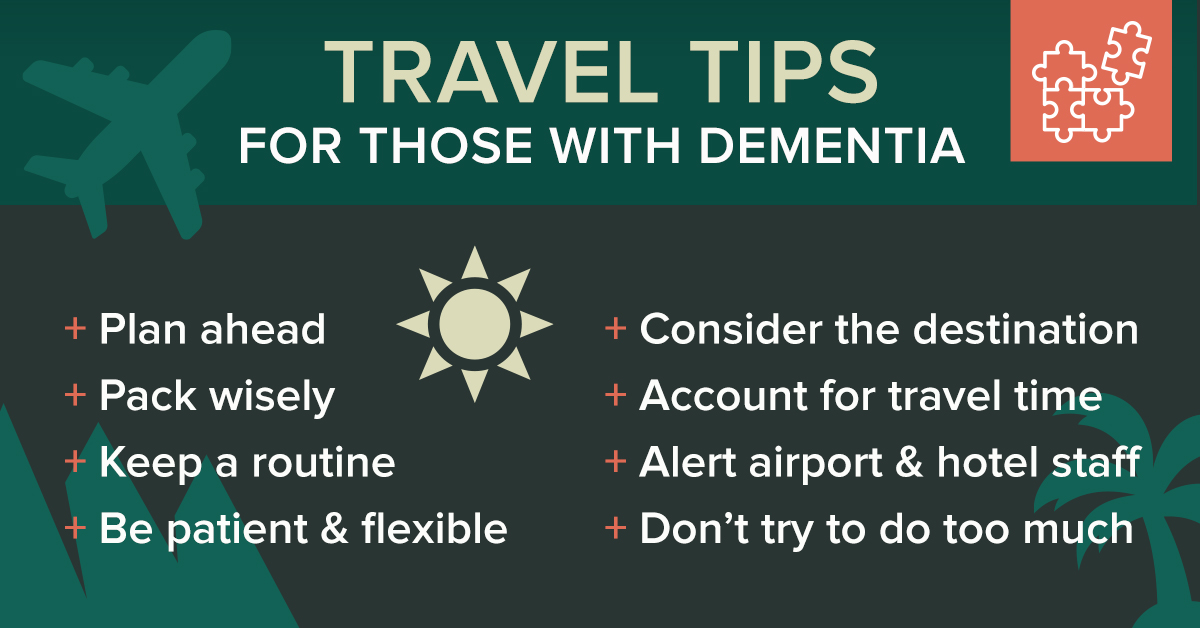Travel Tips for People Who Have Dementia
Travel Tips for People Who Have Dementia
Prepare for a Memorable and Safe Family Vacation
Are aging loved ones traveling with you on this summer’s family vacation?
While it’s a wonderful opportunity for quality family time, traveling with older loved ones can be challenging, especially if they have Alzheimer’s disease or a related dementia.
“Lots of great memories are made on summer vacations, so it’s wonderful when grandma and grandpa are able to travel with the rest of the family,” said Sierra Goetz, co-founder and operations manager at the HomeCare Advocacy Network (HCAN). “If your senior has health issues, limited mobility or dementia, travel may be challenging – but it’s not impossible. Taking a few extra steps before you hit the road can help you avoid potential problems”
When traveling with senior loved ones who have dementia, Goetz recommends that you:
Plan Ahead for a Smooth Journey
The more you can plan ahead, the less stressful your trip will be. There are several things you can do before your trip – make packing lists, check travel times, research accommodations, review emergency plans and make sure you have all necessary documents, including medical records and insurance information.
Pack Wisely for Comfort and Convenience
Make sure your senior has everything they will need, including proper clothing, medications and special dietary items. Also include things that might help your senior feel more at ease in unfamiliar surroundings – a favorite blanket or family photos, for example.
Choose Dementia-Friendly Destinations
Choose a destination that is suitable for your loved one’s needs and abilities. A beach vacation, for example, probably isn’t the best choice for seniors who have mobility issues or who are prone to wandering. Ask your travel agent about dementia-friendly destinations, which may be more equipped to handle the needs of travelers who have memory issues.
Manage Travel Time and Comfort
While you might be able to make it to the mountains in one day, that might not be possible for your senior. Sitting in the car for hours on end may be very uncomfortable for them, so consider breaking up the drive. If time is tight, flying might be the best option.
Inform Airport, Hotel, and Restaurant Staff
Communicate with those who engage with your loved one, so they are aware of the situation and can provide appropriate assistance if your loved one becomes confused or agitated.
Maintain a Routine to Reduce Anxiety
Maintaining a familiar routine (meals, medications, etc.) can help reduce your loved one’s anxiety and confusion.
Pace Activities and Plan Rest Periods
You’re on vacation, so you want to make the most of every minute. However, keep your senior in mind as you’re planning fun activities. Carefully consider the duration and kinds of activities you plan – keeping in mind that, for most seniors, late morning to early afternoon is the best time of the day to go out.
Practice Patience and Flexibility
Traveling with someone who has dementia can be unpredictable, so it’s important to be understanding. Allow for plenty of breaks and give your loved one time to adjust to any new surroundings.
Enjoy the Journey Together
“Aside from just being fun, travel is good for seniors – it keeps their mind and body active,” Goetz said. “And, with a little planning, there’s no reason you can’t take your older loved ones along for the ride.”






